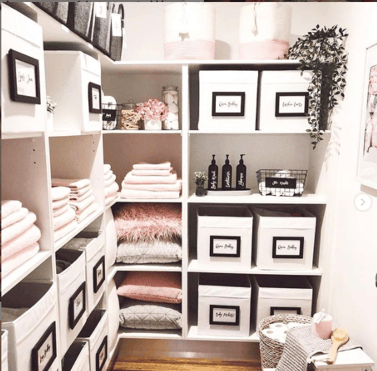Every household has its share of junk, trash, and clutter. Each new day brings with it a list of items your home needs. From groceries to furniture and appliances, there’s always something new to buy for the house. Over time, things that no longer serve their purpose start to pile up in every nook and cranny. Clutter takes up space in your home and can make you feel stressed, low on energy, and annoyed.
Household clutter can be harder to deal with in large homes with big families. With incoming parcels from Amazon, takeout packaging, and a gazillion other items, you have more junk in your home than you should.
Ideally, you want your home to be airy and tidy but organizing clutter can get overwhelming. If you’re wondering where to begin, here are some small tips on decluttering for big families.
1. List Down Your Decluttering Goals
Making lists and setting goals are the best ways to begin decluttering. Sit down with a notepad and jot down a list of places in your home that need decluttering. Start with the kitchen and move to the bedrooms. From cupboards and shelves to storage rooms and closets, set aside a definite timeline for each area.
Decluttering in large homes is a team effort. Get every member of the household involved and allocate one room for each person. This makes it easier to focus and the work gets done faster. Assess which rooms and areas need more effort and time than others and pace your clean-up efforts accordingly. If you’re not sure about where to begin, take small steps and go from one room to another.
2. Use Labelled Boxes for Sorting
While decluttering you’re going to come across a bunch of stuff you didn’t know you had from old things that have sentimental value to things that you’ve grown out of. This could even include books that you once read, old stationery, gadgets that don’t work, broken accessories, outdated wires, and so on.
Establish a box system to sort these items. Put all the items you’ve outgrown in a box and label it “The Donation Box.” This could include clothes, accessories, shoes, and other items that are in good condition but you don’t need anymore. Things that are broken and don’t work anymore can be thrown into another box labeled “Trash.”
Some items are occasional or seasonal. You don’t need them on a day-to-day basis but they come in handy when the situation calls for it. Put these items in a “Storage” box. Keep this box in a place that’s within your reach for easy access when you need it. If you have a storage room in your home, this box can go there.
Image From @organizedandsimplified4u
3. Take Out The Clutter
Once everything is in boxes that are tagged and labeled, decluttering becomes easy and less time-consuming. Put the storage boxes in storage and distribute the donation boxes to people, groups, or institutions that need them.
Glass items like old bottles, used notebooks, and cardboard boxes can go to a neighborhood recycler. If you have items that are in pristine condition and you don’t want to give them away, sell them at a garage sale. Lastly, the “trash” box can go to a dumpster. Hire a mobile dumpster to load up the trash and drive it away.
Additional Tips
1. Check Expiry Dates
Kitchens, medicine cabinets, and utility areas typically have the largest amount of clutter since big families usually buy groceries and food items in bulk. This holds true for cleaning supplies like detergents and personal care items like shampoos. We buy medicines to treat a particular illness, but once we’ve recovered, that bottle of cough syrup or those headache pills have no further use.
Check for expiry dates to see if you can still use food, toiletries, cosmetics, and medicines. If they’re expired, they don’t belong in your home. Decluttering your home is a tedious affair, but once it’s done, you’re going to feel so relieved to have cleared up all that space.
Cramped kitchens with edible and organic trash invite pests. Avoid this mess by throwing out expired and rotten food items. They attract flies and this will help avoid the nuisance.
2. Inspect Flat Surfaces
Tabletops and counters are often overlooked even if you clean regularly. You’d be surprised to find unnecessary items piling up on your work desk and bedside tables. You’ll likely come across old receipts, empty refills, expired medicines, and so on while decluttering. Flat surfaces need decluttering too.
It’s also good to check when you used something last. If it’s been a while and you don’t think you need it anymore, put it in one of your boxes.
3. Flock Them Together
Organizing your clutter means neatly gathering things that belong together. For example, tools belong together in a toolbox. All your stationery should have a designated place. Books should always have a dedicated space in your home like on a bookshelf. If you see random things lying around and they are not being used, collect them and store them away someplace that you’ll remember.
4. Repair and Restore
You don’t have to blindly discard things that don’t work. When decluttering, check to see if damaged goods can be fixed. You never know when you may need a particular item. If it’s expensive, you may want to get it repaired and put them away for later use.
5. Don’t Burn Out
Decluttering is a lot of work. The key is to maintain a steady pace and mental balance. If you feel like you’ve done enough for the day, take a break, get a good night’s rest, and start fresh the next day. Forcing yourself to tidy up when you are tired can mean a bigger mess. It can demotivate you and curb your enthusiasm.
Once you have a plan in motion, take it easy and don’t rush it. Decluttering is all about mindfulness.
Living In the “Here and Now”
Simply put, decluttering is a lifestyle. When you declutter and clear out spaces, you make room for new things and new beginnings. Collecting and hoarding can keep us stuck in the past. It may not seem like it at first, but living in the present and being in the here and now is the essence of decluttering.
Clutter disrupts the natural flow of energy but decluttering brings positivity into your living space.

